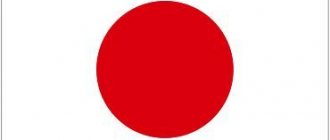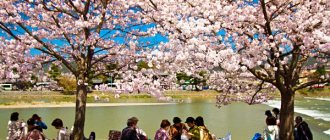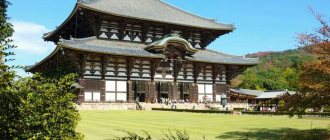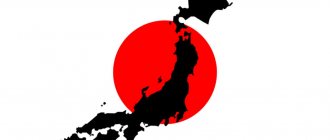Japan: the life of ordinary people and the peculiarities of the country
Climate and ecology
Japan can be roughly divided into 6 zones, the climate of which varies from temperate to subtropical in the southwestern islands. The island of Hokkaido is characterized by cool summers and long, frosty winters; the central highlands have a typical island climate with large temperature differences between night and day, winter and summer. The southwestern islands have warm winters, hot summers, and a pronounced rainy season.
There are more than 100 active volcanoes on the Japanese islands, and their number is gradually growing. Every year, more than 1.5 thousand earthquakes with a magnitude of 1 to 9 occur in Japan, and typhoons periodically sweep over the country, causing serious destruction.
Active volcanoes in Japan look majestic, but can pose a danger to the population
The country's ecology is a sore spot for the Japanese. In the middle of the last century, during a period of rapid industrial development, significant environmental pollution occurred, the consequences of which are still being eliminated. The situation is aggravated by the significant overpopulation of the archipelago. Today, the main problems of the Land of the Rising Sun are:
- urban air pollution;
- irreversible climate change;
- eutrophication of waters (excessive increase in the content of nutrients in water bodies), leading to a deterioration in their quality and active growth of algae;
- recycling.
Features of mentality
Throughout their entire adult lives, the Japanese have been learning to understand each other without words. Preferences are rarely expressed verbally, so in the Land of the Rising Sun everyone has to be a little telepathic. Here the hostess will not ask you which cuisine you prefer. When inviting guests to her place, she will prepare several dozen dishes for almost every taste.
The quintessence of mutual understanding is the Japanese word yoroshiku, which means roughly the following: “You understand what I want to do. I understand that you understand this. Therefore, I count on you to do what I wanted to do, in exactly the way I planned. And thank you for understanding me by taking the trouble to fulfill my desire.” It is very difficult for a European to grasp all the shades of yoroshiku, since in our culture it is customary to state one’s desires in detail and certainly insist on their fulfillment.
The Japanese have also mastered the art of pretending not to understand someone's question if they fear the answer might offend or upset them. In this case, residents of the Land of the Rising Sun try to shift the conversation to a more pleasant topic or get away with vague phrases. They prefer not to talk about things that could lead to a dispute at all.
In all areas of Japanese society, saving face is considered especially important. If a mistake is made, it must be publicly corrected. Any misconduct requires an official apology, especially for mistakes at work. After public repentance, the awkward situation is smoothed over, and the incident is forgotten. People stop asking awkward questions because the case is closed.
Europeans living in the Land of the Rising Sun are quickly adopting Japanese traditions. Bowing for any reason is one of them
Way of life
The day of an ordinary Japanese, like a citizen of any other country, is divided into 3 parts: work, family, personal affairs. The difference is how much time they take.
Many people consider the Japanese to be workaholics. This is true: the average resident of a metropolis spends at least 10 hours at work. If you add another 1.5–2 hours to travel to your office, it turns out that more than half a day is devoted to work every day. In addition, there are also obligatory gatherings in a cafe after work, corporate events that cannot be ignored, and joint trips to nature.
Family is very important for the Japanese, but the attitude towards it here is fundamentally different from that accepted among Europeans. First of all, the majority of the country's residents do not marry for love. In Japan there is a concept called antei, which literally means stability. It includes: savings from 5 million yen (about 47.9 thousand US dollars) and a good job with prospects for career growth, having your own home is welcome.
It is a rare girl who will risk marrying a young man who does not have anteas. Situations are common when Japanese women date the one they love and marry the one who has an antecedent. It is clear that in such marriages of convenience, very cool relations often reign. However, young people who have not started a family by the age of 30 are looked at askance. Single men have no career prospects; single young women are shunned at work and among friends.
Hobbies are another part of Japanese life, the importance of which is difficult to overestimate. By choosing a hobby, a Japanese person becomes a member of a certain social group, to which he will belong for many years . Moreover, it is not so important what exactly to do: residents of the Land of the Rising Sun indulge in photography and ikebana with equal passion. Success is not important here: the Japanese can study a foreign language for years without progressing one iota, or learn the same ballroom dance for several years. Much more important than visible results is regular attendance at classes, communication with members of your circle and the ritual of getting together.
Video: how to live in the Japanese outback
Standard of living
Japanese cities bring down their prosperity and all the noise and din of ultra-modern megacities on visitors. The scale of man-made civilization is amazing: the monstrous tangle of expressways over Tokyo, armies of pedestrians who seem to be attacking each other, huge skyscrapers obscuring the sky, as if transporting the alien to the world of the future. At the same time, order and cleanliness reign everywhere, public services work impeccably, public transport runs like clockwork, people are dressed neatly and tastefully.
The apparent feeling of wealth and well-being is confirmed by statistical data. Japan is one of the top five countries in terms of personal safety: the problem of street crime has been practically solved here .
The level of well-being of the Japanese is approaching the average for OECD (Organization for Economic Co-operation and Development) countries. The net income of a Japanese family after taxes in 2015 was approximately $2.3 thousand per month, in OECD countries - $2.4 thousand per month. The average salary in the country at the beginning of 2021 was $3.4 thousand.
In Japan, the employment problem has been practically solved. By mid-2021, 73% of people aged 15–64 are in paid work, notably higher than OECD countries (66%).
The Japanese have virtually no equal in education and professional skills. In terms of reading speed, math and science knowledge, Japanese students scored about 540 points in the OECD Program for Student Assessment, compared with 490 points in the OECD.
In the service of the Russian Empire
Subjects of the Russian sovereign came to Japan much later. Unlike the first Japanese, who ended up in Russia against their own will, the Russians came to Japan for a specific purpose.
So, in June 1739, ships flying Russian flags sailed to the shores of Japan. On one of them was Captain Martyn Shpanberg, a Dane by origin, on the second - the Englishman William Walton. Both were subjects of the Russian Empire. The sailors who landed from these ships became the first Russians on Japanese soil.
Capital Cities
How do different capitals differ in area? I also suggest comparing. Let's start with Tokyo. The huge metropolis covers 2,187 km². Let's look at the area of Moscow, it is 2,567 km². There is not too much difference between our capitals, if we take into account that the area of Russia is much larger. Well, if we compare it with St. Petersburg, we will see that the city is half the size of Tokyo.
The size of London differs greatly from both Moscow and Tokyo; it occupies 1,580 km². The capital of Italy took in more space than all of the above cities, 2,864,348 km².
All these megacities cannot be small; they are capitals and must correspond to their status.










